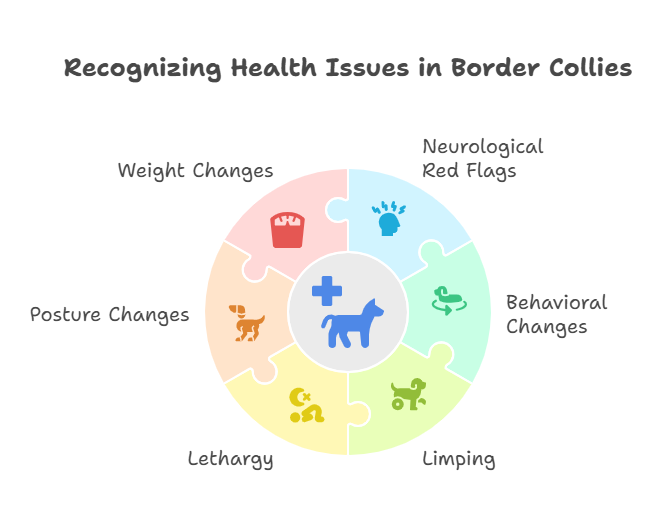Border Collies often face hip dysplasia, eye disorders like Collie Eye Anomaly, epilepsy, and exercise-related issues. Early checkups and a healthy lifestyle can help prevent or manage most of these problems. This is the answer to the question: What health issues are common in Border Collies?
Border Collies are smart, fast, and full of energy. But even the healthiest-looking dogs can face problems that aren’t easy to spot. Many Border Collie owners are surprised when their dog starts limping, acting strange, or having trouble seeing. These signs often point to common health issues that affect this amazing breed.
If you’ve noticed changes in your Border Collie—or just want to stay ahead of future problems—you’re in the right place. This guide explains what to watch for, why these issues happen, and how to protect your dog with smart care and vet-approved tips. Let’s explore each condition step by step, so you can keep your Border Collie happy and healthy for years to come.
Understanding the Border Collie Breed
History and Behavioral Traits
The Border Collie comes from the border area between England and Scotland. These dogs were bred to herd sheep. That’s why they are so smart, quick, and alert. They can solve problems, follow commands, and even learn tricks faster than most breeds.
Because of their sharp minds and high energy, Border Collies need both mental and physical exercise every day. If they get bored or don’t move enough, they can develop stress or act out. This is not a lazy dog breed—they are working dogs through and through.
Their strong herding instinct may even show up around children, other pets, or cars. This is natural, but owners should know how to guide this behavior early. Proper training is key.
Why Health Awareness Matters in Active Breeds

Because Border Collies are always on the move, they put a lot of strain on their joints, muscles, and heart. If they don’t get the right care, small issues can turn into bigger health problems.
They also have some genetic risks. These are health problems passed down through breeding. Without early vet checks or testing, many of these issues may go unnoticed until they become serious.
Knowing what to look for can save time, money, and stress. It also helps your dog live a longer, better life. According to the American Kennel Club, regular screening for common conditions is one of the best steps a Border Collie owner can take.
Common Genetic Health Problems in Border Collies
Hip Dysplasia
This is one of the most common genetic issues in Border Collies. Hip dysplasia happens when the hip joint doesn’t fit right. Over time, it wears down the joint and causes pain. Your dog might limp, move slower, or avoid stairs.
X-rays and physical exams are used to find this issue. Your vet may suggest weight control, joint supplements, or in severe cases, surgery.
Collie Eye Anomaly (CEA)
CEA is a genetic condition that affects the retina in the eye. It can lead to vision loss or even blindness. Many Border Collies are born with it, but symptoms don’t always show right away.
DNA testing is the best way to know if your dog has this condition. Breeders often screen for it before selling puppies. If caught early, some dogs may adjust well without treatment. You can learn more about CEA from PetMD.
Epilepsy in Border Collies
Epilepsy causes seizures that may look like shaking, confusion, or falling over. It can be scary to see, but many dogs with epilepsy can live full lives with the right medicine.
Your vet may run blood tests and brain scans to rule out other causes. Medications like phenobarbital or potassium bromide help control seizures.
Progressive Retinal Atrophy (PRA)
PRA is another inherited eye problem. It causes the cells in the retina to break down slowly over time. Dogs with PRA often start losing vision at night, then during the day.
There’s no cure yet, but early diagnosis can help you prepare your home for a dog with low vision. Genetic testing can spot PRA even before symptoms show.
Lifestyle-Related Health Concerns
Exercise-Induced Collapse (EIC)
EIC makes dogs weak or collapse after intense play or running. This is more common in young adult dogs. If your Border Collie suddenly sits down or seems dizzy after exercise, EIC might be the cause.
It’s best to stop activity right away and call your vet. Dogs with EIC can still live active lives, but they need to avoid overexertion.
Obesity and Joint Stress
Border Collies are lean by nature. If they gain too much weight, it can strain their joints and cause long-term damage. Being overweight also makes genetic problems like hip dysplasia worse.
Stick to high-quality dog food, avoid too many treats, and keep your dog active. You can check your dog’s weight range on trusted vet websites like VCA Hospitals.
Allergies and Skin Sensitivities
Many Border Collies have itchy skin or food allergies. You may see red patches, hair loss, or frequent scratching. Common triggers include grains, beef, dairy, or pollen.
Your vet may suggest switching to a hypoallergenic diet or doing allergy testing. Omega-3 supplements can also help soothe the skin.
| Condition Type | Examples | Can It Be Prevented? |
|---|---|---|
| Genetic Conditions | Hip Dysplasia, CEA, Epilepsy, PRA | Partially, through testing and responsible breeding |
| Lifestyle Conditions | Obesity, EIC, Allergies | Often preventable with good care and routine checks |
Symptoms to Watch Out For

Neurological Red Flags
Some health problems in Border Collies can affect the brain and nerves. These are often harder to spot than physical injuries. If your dog starts acting confused, walking in circles, or staring at walls, it could be a sign of a neurological issue.
Seizures are another major warning sign. These may look like shaking, falling over, or sudden stillness. If your dog has a seizure, stay calm and call your vet right away. Early care can help manage conditions like epilepsy or other nervous system problems.
Behavioral changes also matter. If your dog becomes suddenly aggressive, fearful, or withdrawn, this could be linked to brain health. According to PetMD, changes in behavior are often the first clue something is wrong.
Limping, Lethargy, and Posture Changes
Border Collies are normally active and alert. If your dog starts limping, sleeping more than usual, or avoiding stairs, don’t ignore it. These signs often point to joint pain, injury, or internal issues.
Watch your dog’s posture. Hunched backs, dragging feet, or slow rising from the floor can signal discomfort. Joint problems like hip dysplasia or arthritis often appear this way. Catching these signs early helps prevent long-term damage.
Weight gain or loss can also be a symptom. A sudden change in appetite or energy level may hint at thyroid problems or illness. Routine vet checks and blood work help spot these issues before they get worse.
Diagnosis and Veterinary Care

Genetic Health Testing & Screening
Knowing your dog’s health risks early is one of the best things you can do. Genetic testing can find hidden problems before they show signs. These tests check for conditions like Collie Eye Anomaly, epilepsy, and PRA.
If you’re buying a puppy, ask for genetic test results from the breeder. Many responsible breeders follow the guidelines set by the Orthopedic Foundation for Animals (OFA), which lists recommended tests for Border Collies.
For dogs you already own, your vet can suggest lab partners that offer DNA testing. Some companies even let you collect a cheek swab at home. Once you know your dog’s risks, you can make smarter health choices.
Routine Check-ups & Preventive Lab Work
Border Collies should visit the vet at least once a year. Older dogs or those with health issues may need more visits. These exams help catch problems early, even before symptoms start.
Your vet may suggest blood tests, x-rays, or eye exams during checkups. These are especially helpful for finding early signs of joint issues, infections, or organ problems.
Dental health also matters. Gum disease can cause pain and lead to other health problems. Vets often check teeth during annual visits.
Vaccines and parasite protection are a key part of each checkup. Keeping your dog up-to-date helps prevent diseases like rabies, parvo, and Lyme disease. You can review ASPCA vaccination guidelines to stay on track.
Preventive Health Strategies
Proper Nutrition and Joint Health Supplements
Feeding your Border Collie a high-quality diet keeps their body strong. Look for foods with real meat, healthy fats, and added vitamins. Avoid cheap brands with fillers like corn or soy.
For joint support, vets often suggest glucosamine and chondroitin. These are found in many dog foods or sold as chewable treats. Fish oil is another great supplement. It supports brain health, reduces swelling, and improves coat shine.
Overfeeding leads to weight gain, which puts stress on the hips and knees. Measure your dog’s food and limit treats. If you’re unsure how much to feed, ask your vet for a custom plan.
Consistent Vaccination and Parasite Control
Border Collies spend lots of time outdoors, so they need protection from bugs and disease. Monthly flea and tick meds keep pests away. Yearly vaccines guard against viruses like distemper and kennel cough.
Some diseases, like leptospirosis or Lyme, come from water or tick bites. If you live in a high-risk area, your vet may suggest extra vaccines. These small steps prevent major problems later.
Use heartworm prevention year-round. Heartworms spread through mosquito bites and can be deadly if untreated. Most heartworm pills also treat roundworms and hookworms, giving you full coverage.
Mental Enrichment and Physical Activity
Mental health is just as important as physical health. Border Collies are smart dogs that need challenges. Puzzle toys, scent games, and short training sessions help keep their minds sharp.
Daily walks, runs, or playtime are a must. Without exercise, Border Collies may develop anxiety or bad habits. Agility sports or herding games are fun ways to keep them fit and happy.
If you’re busy, consider doggy daycare or hiring a pet walker. A tired dog is a happy dog—and less likely to develop behavior or health problems.
Frequently Asked Questions
What is the life expectancy of a Border Collie with health issues?
Most Border Collies live between 12 to 15 years, even if they have some health problems. With early vet care and a healthy lifestyle, many dogs live full, active lives. Dogs with chronic conditions like hip dysplasia or epilepsy can still thrive with the right treatment and support.
Are Border Collies more prone to seizures than other breeds?
Yes, Border Collies have a higher risk of idiopathic epilepsy compared to many breeds. The first seizure usually happens between 1 and 5 years of age. Vets can help manage this with long-term medication and routine monitoring. According to PetMD, early treatment is key to reducing risks.
What should I do if my Border Collie has frequent skin issues?
Itchy skin, red patches, or constant scratching are signs of allergies. These can come from food, grass, dust, or even shampoo. Your vet may suggest switching diets, allergy testing, or adding supplements like omega-3 fatty acids. A VCA article on dog skin allergies offers helpful insight.
Can proper training reduce health risks in Border Collies?
Yes, training can help reduce stress, improve behavior, and avoid injuries. Dogs with good recall and leash manners are less likely to run into danger or overexert themselves. Mental stimulation through training also prevents anxiety, which can affect physical health.
Should I get pet insurance for a Border Collie puppy?
Pet insurance is a smart choice, especially for breeds with known health risks. Coverage often includes diagnostic tests, surgeries, and chronic condition treatments. Some plans even cover genetic testing. Compare providers and choose one that includes breed-specific care. The ASPCA pet insurance guide is a great place to start.
How often should a Border Collie have health checkups?
Most Border Collies should see the vet at least once a year. Dogs over age 7 or those with medical conditions may need visits every 6 months. These exams help catch problems early and keep your dog on the right track. Ask your vet about setting up a custom health plan based on your dog’s age and activity level.
Conclusion
Border Collies are smart, active, and loyal dogs—but they also need careful attention to their health. From genetic conditions like hip dysplasia and epilepsy to lifestyle issues like obesity and allergies, there are many things owners should watch for.
The good news is that most problems can be managed or even prevented with early care, regular checkups, and a healthy routine. Feeding the right food, providing daily exercise, and staying up to date on vet visits can make a big difference.
Knowing what to expect helps you give your Border Collie the best life possible. When you stay informed and take action early, you can enjoy more happy, healthy years together.
